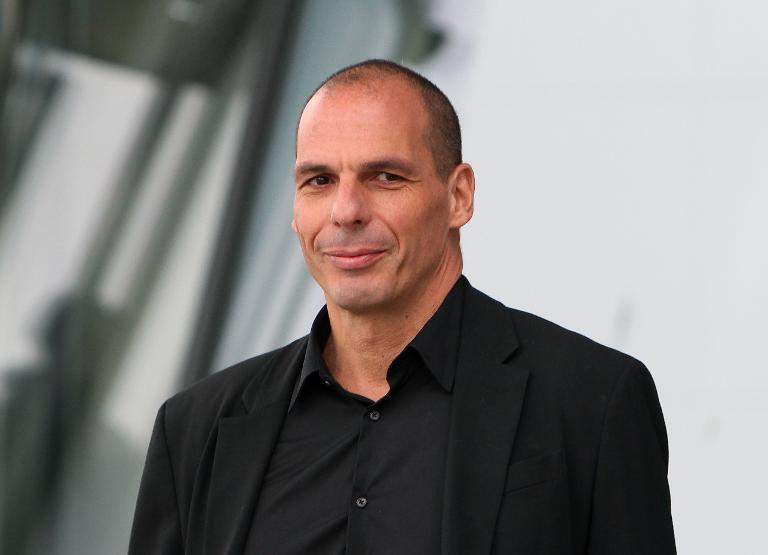
Greek finance minister in Berlin after ECB turns up heat
Yanis Varoufakis has his first face-to-face meeting with German Finance Minister Wolfgang Schaeuble in Berlin, seen as the toughest nut to crack in gaining backing for an easing of the terms of Greece's massive bailout deal.
The new Greek finance minister's stop in Berlin follows a high-stakes visit to ECB headquarters in Frankfurt Wednesday to try to drum up support for the new anti-austerity government's debt relief bid.
Hours after the Frankfurt visit, the ECB decided to no longer allow banks in Greece to use government debt -- which has a junk rating -- as collateral for loans.
The move sent European stocks sliding in early trade Thursday and was widely viewed as a warning to Greece to reach a rapid agreement on renegotiating its 240-billion-euro ($270 billion) EU-IMF bailout, or face further consequences.
Varoufakis and Germany's veteran finance minister will hold a joint press conference in Berlin at 1130 GMT.
The Greek stock market plunged more than nine percent, while its borrowing rate soared above the symbolic level of 10 percent after the ECB move, which prompted the Greek finance ministry to insist the country's banking system "remains adequately capitalised and fully protected".
Greece defiantly said on Thursday it would not be "blackmailed" and insisted its banks were secure.
- 'Pressure will rise' -
Prime Minister Alexis Tsipras and Varoufakis -- whose radical left Syriza party stormed to victory in elections on January 25 -- have embarked on a whistle-stop tour of major European capitals in recent days to build support for a new debt agreement with creditors.
Elected on a pledge to end austerity policies imposed on Greece as part of its bailout, Tsipras faces the delicate task of persuading his European partners to reverse course while ensuring Athens still gets the aid required to avoid a default.
"I think that of all countries in Europe the Germans understand best this simple message," Varoufakis said on Germany's ARD public broadcaster.
"If you humiliate a proud nation for too long... without light at the end of the tunnel, then the pressure will rise in this country at some point," he added.
The ECB statement came just hours after Varoufakis held his first talks with ECB chief Mario Draghi as part of his push to renegotiate the bailout.
In Brussels, Tsipras struck an upbeat note after talks with European Commission chief Jean-Claude Juncker and EU president Donald Tusk Wednesday, saying he was optimistic of a "viable and mutually acceptable solution".
A Greek government source said Tsipras and Juncker discussed plans to jointly create a four-year reform plan for Greece, as well as a bridging deal to give Athens time to draw up plans for reforms including on corruption and tax evasion.
But Tusk acknowledged that resolving the showdown over Greece's debt was likely to be "difficult" and needed "cooperation and dialogue as well as determined efforts by Greece".
Ahead of the ECB talks, Varoufakis had told the German weekly Die Zeit that the ECB "should support our banks so that we can stay afloat", acknowledging that Greece was "a bankrupt country".
The former economics professor later described his talks with Draghi as "very fruitful" -- just before the ECB tightened the screw.
- 'Robust early response' -
After a meeting of its policy-setting governing council late Wednesday, it said it was ending a special lending waiver for Greece because "it is currently not possible to assume a successful conclusion of the programme review".
The ECB waiver, which will end on February 11, had allowed banks to pledge their Greek bonds as collateral, even though the securities did not meet standards for a minimum credit rating.
ETX Capital analyst Daniel Sugarman described the ECB decision as "a robust early response to Athens' efforts to renegotiate bailout terms with creditors".
Greek banks will still be able to access funds through an emergency liquidity assistance scheme, but the "indirect implications" of the ECB decision could be more significant, said Ebrahim Rahbari, analyst at Citi European Economics.
These could range from indicating the ECB "is unwilling to provide unlimited, unconditional support for Greek banks" to worsening the availability of private funding for them, he said.
The International Monetary Fund -- the third part of the so-called "troika" that oversees Greece's bailouts along with the European Commission and ECB -- has said it is not in debt talks with Athens.
The new government has blamed its fiscal problems mainly on the austerity shackles fixed by Germany, arguing the restrictions have choked growth in an economy that has shrunk by a quarter.
German Chancellor Angela Merkel on Wednesday tried to quash talk that Syriza could play on divisions within Europe.
"I don't think that the positions of the member states of the eurozone with regard to Greece differ, at least in terms of substance," she said.

Legal Disclaimer:
MENAFN provides the
information “as is” without warranty of any kind. We do not accept
any responsibility or liability for the accuracy, content, images,
videos, licenses, completeness, legality, or reliability of the information
contained in this article. If you have any complaints or copyright
issues related to this article, kindly contact the provider above.
Most popular stories
Market Research

- Pepeto Presale Exceeds $6.93 Million Staking And Exchange Demo Released
- Citadel Launches Suiball, The First Sui-Native Hardware Wallet
- Luminadata Unveils GAAP & SOX-Trained AI Agents Achieving 99.8% Reconciliation Accuracy
- Tradesta Becomes The First Perpetuals Exchange To Launch Equities On Avalanche
- Thinkmarkets Adds Synthetic Indices To Its Product Offering
- Edgen Launches Multi‐Agent Intelligence Upgrade To Unify Crypto And Equity Analysis


















Comments
No comment